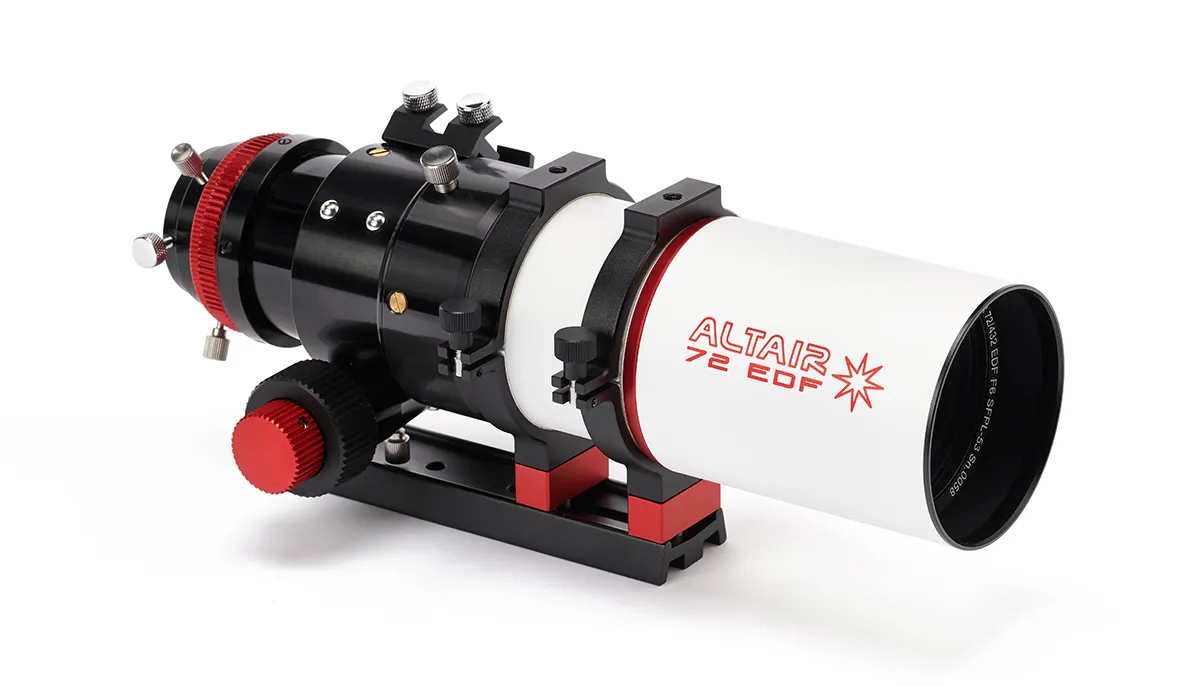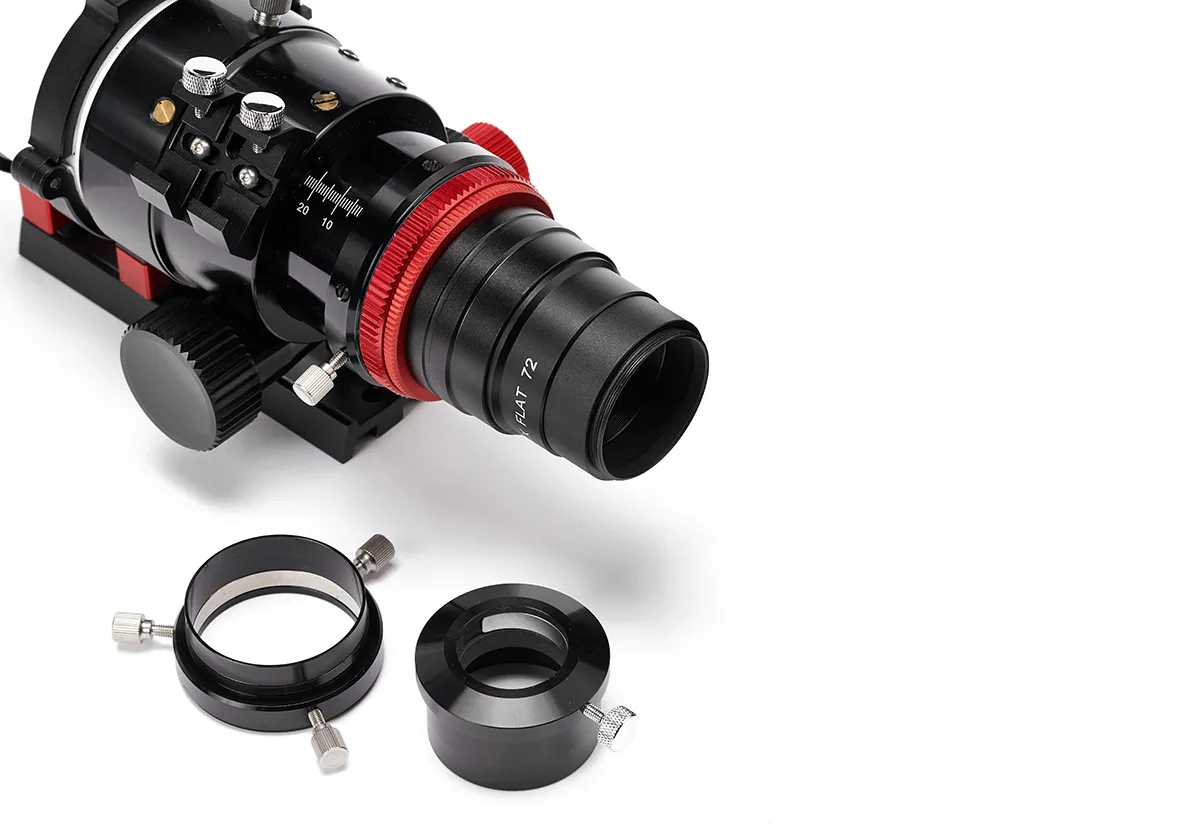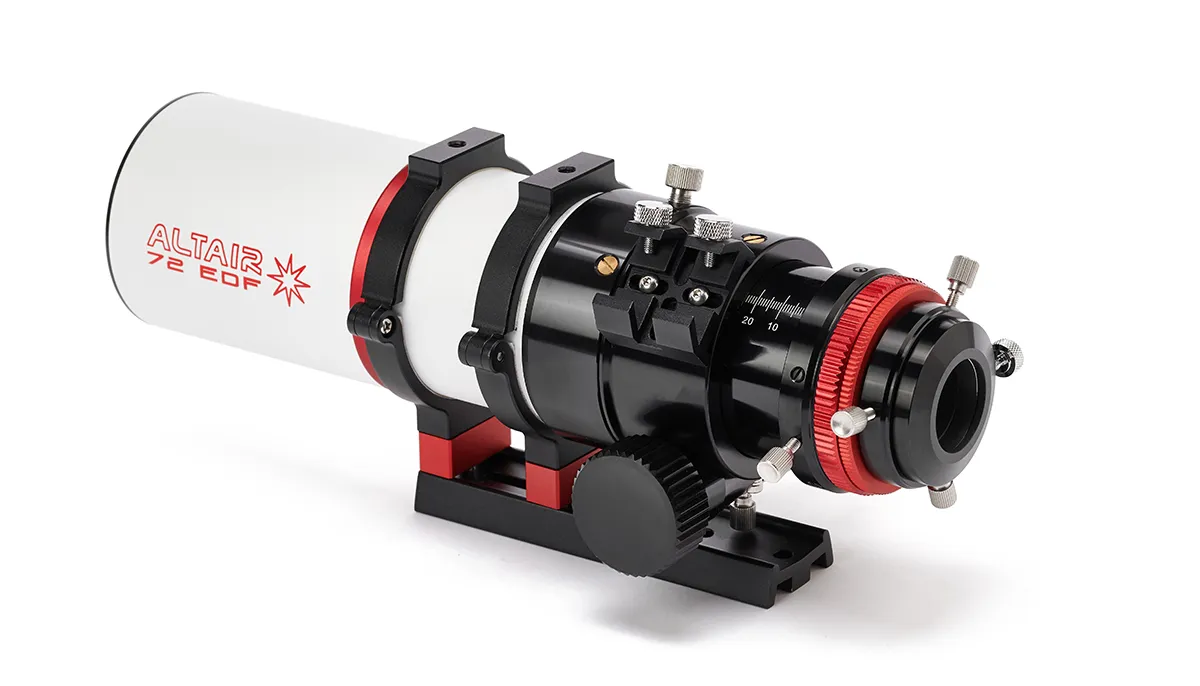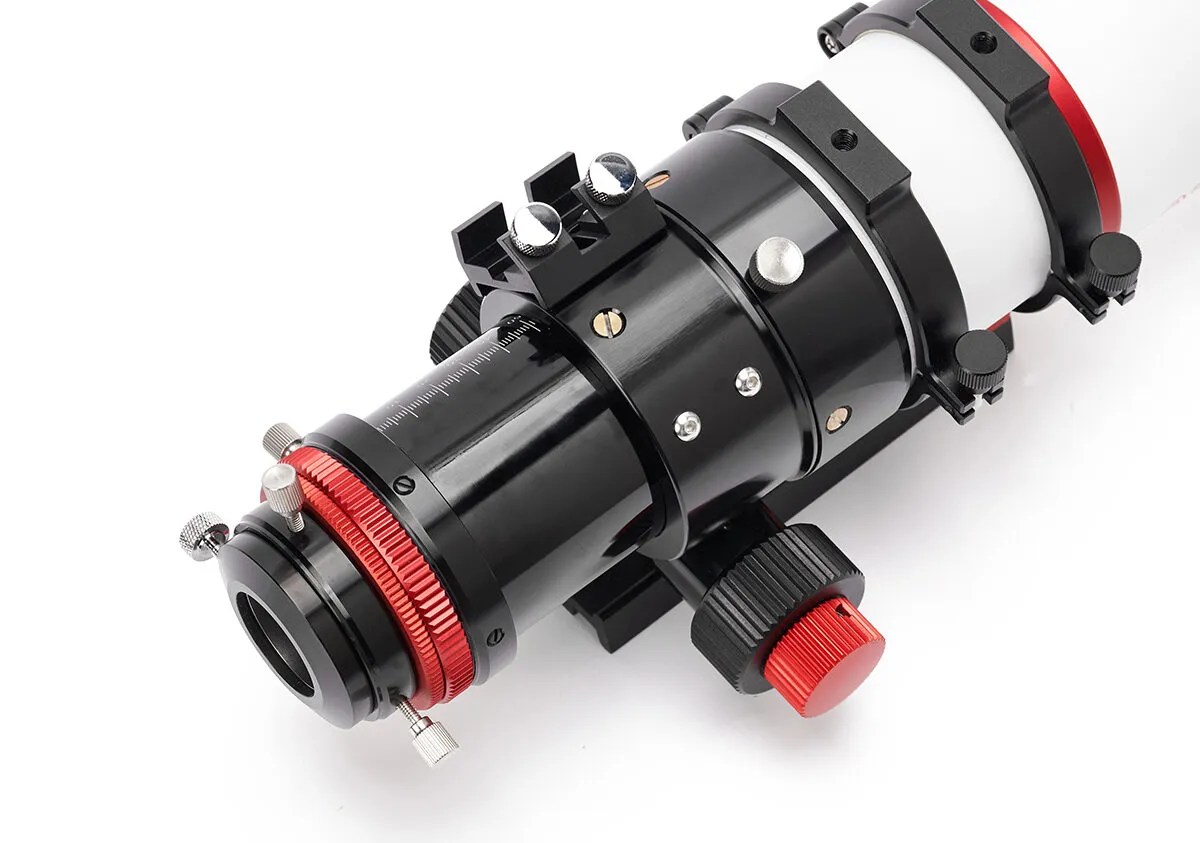Small, short focal length refractors are extremely popular and – with a weight of 2.5kg and length of 32.5cm – the Altair 72mm EDF is marketed as a travel telescope. It’s no one-trick pony, however, as the 72mm EDF is sold in two different configurations.
Here we're reviewing the ‘Deluxe’ version, which is supplied with a CNC-machined dual-speed focuser, rear camera rotator and extra height tube rings.
The ‘Standard’ version, meanwhile, is tailored for visual use and is fitted with a white powder-coated aluminium focuser that doesn’t include the rear camera rotator.

The telescope arrived in a single box, with its tube rings and a dovetail bar already in place. We noted that a carry case is not supplied.
Our first impressions of the Altair 72mm EDF Deluxe is that it feels well made; it has a reassuring weight when it’s held in the hand and everything feels solid and put together with care.
Both versions come with a 15cm dovetail bar. Despite our attempt to mount the 72mm EDF Deluxe as far forward as possible in the saddle, with the dovetail bar installed well under the focuser, we were unable to balance the declination axis with either a DSLR or CCD camera.
Balancing the scope with a diagonal and eyepiece, however, was not an issue, although it’s worth noting that heavier eyepieces may prove more difficult.

The aluminium dew shield has a firm and smooth movement and it stayed in place without any issue, despite not having a thumb screw to secure it.
With the addition of a dew heater strap, we had no issue with dew, despite being out during some very damp and misty winter evenings.
Altair sells a matching field flattener that has been designed specifically for this telescope and its astro cameras.
This screws onto the focuser and has a matching thread that allows Altair cameras to screw directly to the flattener with the ideal spacing (55mm).
It is worth noting that this thread is not the standard T-thread/T-mount, which resulted in us not being able to obtain ideal spacing due to the necessity of adding thread adaptors. The closest we could achieve was 57mm with our CCD camera, and 65mm with a DSLR.

At 2.5kg, the Altair 72mm EDF Deluxe is lightweight and short enough for a robust star tracker mount, but for the purpose of this review we tested it on a lightweight equatorial mount.
With a DSLR attached and with a small adjustment to the tension adjuster, the focuser extended smoothly and felt very secure.
The dual-speed dial made fine, precise focus easy. The focus wheels offer a good level of resistance, with zero play.
The focuser has a distance scale that is clear to see, making it easy to repeat rough focus. Over the course of five hours, we found that the focus held perfectly, despite a significant drop in temperature.
We put the Altair 72mm EDF Deluxe through its paces over several nights of visual astronomy and astrophotography.

Pointing the scope at a 90%-illuminated Moon resulted in a crisp image with no hint of colour fringing, with stars appearing sharp to the edge of the field of view with no distortion.
This was also the case in the DSLR images, which showed no vignetting and did not require flat frames to be applied.
There was evidence of some curvature when using the Altair field flattener, but this may have been due to the incorrect spacing. This was not evident, however, when using a third-party flattener on the scope.
A focal length of 432mm gives the Altair 72mm EDF Deluxe a wide field of view, and when it’s paired with a DSLR or a medium-sized astrocam it will allow you to capture the larger nebulae or even large targets such as the Pleiades open cluster.
Overall, we were very impressed with the Altair 72mm EDF Deluxe. Nnot only will this fit comfortably in a backpack for those trips to dark-sky sites, but it would also be an excellent addition as a home-imaging or visual scope in a permanent observatory.
Altair has really thought about the end user in developing the ‘Deluxe’ version of its 72EDF, resulting in some well-designed additional features.
Altair 72mmEDF Deluxe refractor focuser

The CNC-machined focuser that’s fitted to the ‘Deluxe’ Altair 72mm EDF is designed with astrophotographers in mind.
It’s a solid rack and pinion focuser, with smooth movement provided by both coarse and fine focus knobs, while a tension-adjuster allows even the heaviest of cameras to be attached.
This model has dual rotators that make image alignment easy, while maintaining precise focus without a worry of slippage.
The addition of a finder shoe between the two rotators allows for a finderscope/guidescope to be installed, allowing it to be rotated independently of the telescope, camera and eyepiece.
The barrel of the focuser is threaded, meaning Altair’s field flattener can screw directly onto the scope.
Once your camera is screwed onto the field flattener, there are no friction connections in the imaging setup, eliminating the risk of the camera slipping.
With pre-drilled mounting holes, the focuser is designed to allow a motor drive to be installed, which is a nice touch.
Altair 72mm EDF Deluxe refractor: outstanding features
Objective lens
The lens in the Altair 72mm EDF is an air-spaced doublet, with one of the lenses being made of S-FLP53 ED glass, known as synthetic fluorite. This helps with colour correction and limits colour halos around stars. Altair has also added oversized glass, meaning there were no signs of vignetting when it was used with a modified DSLR.
Extra height tube rings
The Deluxe version is supplied with a pair of machined tube rings that are especially designed for this scope. The rings have a spacer installed that allows greater clearance between the scope and the mount saddle. The additional height ensures that the tension-adjuster knob is still accessible and isn’t hindered by the dovetail bar.
Dovetail bar
The Deluxe version comes with a longer dovetail bar to help you achieve balance in the declination (dec.) axis, an issue all refractor users are familiar with. While this was an improvement over the ‘Standard’ model, we found that even with a light camera attached balance was still unachievable.
Aluminium tube
The Altair 72mm EDF has a full aluminium optical tube, which helps to keep the weight down to just 2.5kg and also allows for rapid cooling (thermal equilibrium). This easy heat transfer also helps with dew prevention, allowing the heat from a dew strap to reach the main optical element.
Threaded camera connector
The focuser barrel is threaded allowing Altair’s matching field flattener, or suitable adaptor, to screw directly onto the telescope. This allowed us to connect our camera directly to the focuser, giving a solid connection and eliminating any risk of your camera coming loose and falling.
Vital stats
- Price £499 (Deluxe), £459 (Standard)
- Optics Doublet refractor with FPL53 (synthetic Fluorite) lens
- Aperture 72mm (2.8-inch)
- Focal length 432mm, f/6
- Focuser CNC- machined, dual-speed rack and pinion
- Extras Tube rings, dovetail bar, rear camera angle adjuster, finderscope bracket, 20mm extension tube
- Weight 2.5kg
- Supplier Altair Astro
- Tel 0126 373 1505
- www.altairastro.com
This review originally appeared in the April 2021 issue of BBC Sky at Night Magazine.
